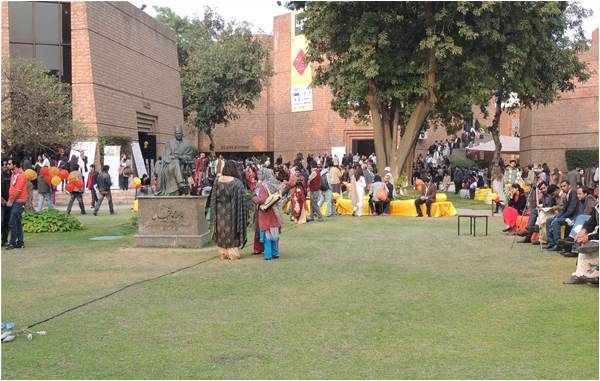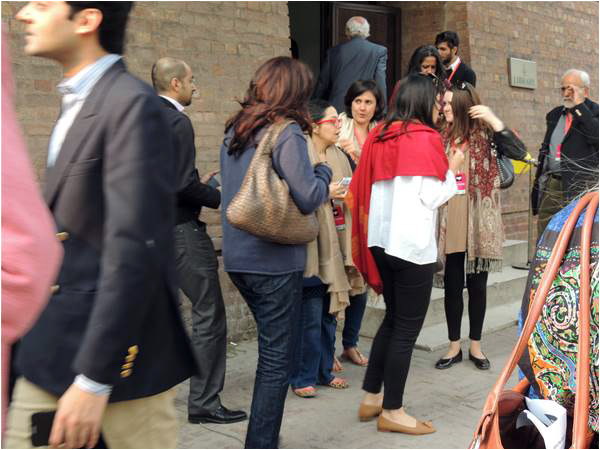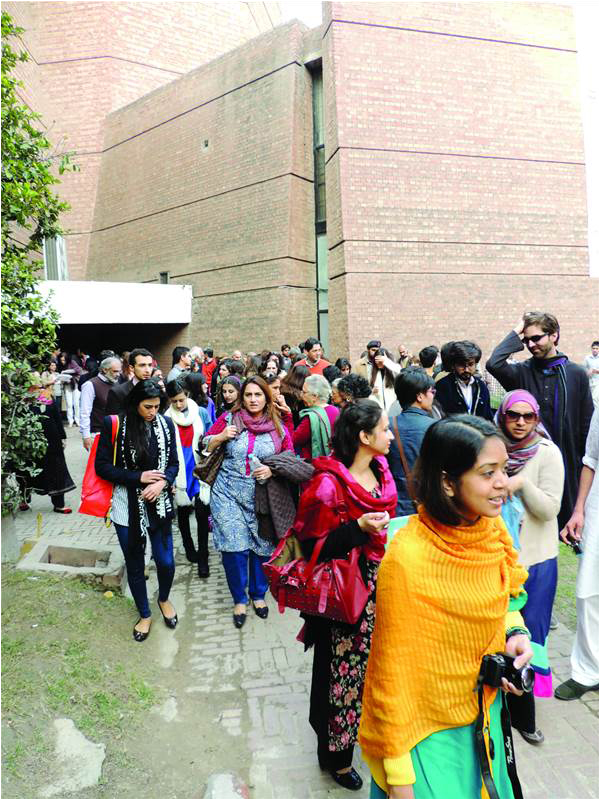
I did not visit last year’s Lahore Literary Festival, and had no real intentions of doing so this year either. The authors attending such gatherings were more or less unknown to me, and I did not particularly care to know them, my philosophical and historical pursuits being rooted more in ancient texts than in modern novels. However, looking at this year’s program, I noticed that a lecture was to be given on Nusrat Fateh Ali Khan, a man whose music I love. I thought I would attend this morning event and disappear before the groupies began arriving for the star attractions.
What happened is that, having learned little from the amiable but somewhat basic discussion of Khan, I decided to try one or two more events, steering away from anything which seemed too literary. Now, the program which is distributed at the festival neither indicates the precise nature of each event, nor identifies in any detail who the participants are; one is forced to deduce from the event title and participant list alone. For most visitors, I imagine, this would not be a problem (many of the visiting speakers are famous, apparently), but for me it meant that my selection of events was almost random.

Fortunately, one of the events I visited was titled “Citizen Cowasjee”, in which four panellists discussed the life and work of Ardeshir Cowasjee, the late Karachi-based Parsee activist and columnist. I walked into the hall having absolutely no idea who this man was, and emerged an hour later contemplating the swiftest way to eradicate my ignorance of contemporary Pakistani writing.
Cowasjee was a big reader of books, an eclectic autodidact who utilized his knowledge to rail against the country’s elite powers and who, despite seemingly having little faith in the country’s prospects, nevertheless countered this despair with fierce articles and expositions on everything from the preservation of trees to the ignorance of politicians.
Historian Ayesha Jalal (another “Citizen Cowasjee” panellist) pointed out that democracy is not a magical panacea, but a system rooted in conflict. In a country which is significantly illiterate, contains a populace which is disrespectful of the law, and possessed of too many incoherent and incompatible views of what constitutes good governance, the performance by educated citizens of democratic duties is crucial. When asked who the next Cowasjee was, panellist Rafay Alam responded by saying “you”, his point being that it is up to all citizens to take a stand, to engage in affairs, to expand their knowledge and put it to use.
Naturally, not everyone has the wealth and resources that will enable them to mimic Cowasjee’s activities, but this is neither required nor desired, for there are many forms of democratic participation and expression. Journalism’s duty to speak truth to power, for instance, was a major topic of discussion at another event at the LLF: Jugnu Mohsin’s session on satire. While she readily admitted that her satire could be construed as the reaction of powerlessness and despair, yet her humorous anecdotes regarding encounters with powerful politicians revealed the concern that they have over what is written about them.

This festival has introduced me to writers I might not have encountered for some time, if at all, so I found the occasion to be educational and a catalyst for further research. But I am unsure how many others shared this experience. Certainly, I heard some cynical criticism describing the festival as little more than an elitist social gathering. Perhaps there is some truth in this – everyone did seem particularly well-deodorized.
But it cannot justly be said that the festival was too narrow in scope, or that the organizers themselves did not try to be inclusive. While almost all the events I visited were held in English, and many of the most famous speakers were known for their English-language works, there were seminars in Urdu, and discussions revolving around art, music, cinema, journalism, and politics. Indeed, the fact that many of the events were not purely literary is what initially attracted me in the first place. And it would be a terrible mistake to assume that the thousands of well-dressed, well-heeled, and well-scented youngsters strutting around the Alhamra spend all their time in frivolous activity and have no interest in making social and political contributions.
While the LLF may be seen by some as a fashionable exercise in mutual backslapping, a more neutral analysis should recognize its serious aspects. It could be improved, of course. Personally, I think the festival could also promote lesser known writers, touch on linguistic, historical, and philosophical matters, provide more room for a diversity of booksellers, promote literary journals, and produce workshops for aspiring writers, amongst other things. But this was only the second such festival, and a rather well-organized one judging from the comments I heard by more experienced festival attendees. One cannot please all of the people all of the time – some people are bound to complain no matter what the LLF was about. Therefore, as it stands, the 2014 Lahore Literary Festival was, to my mind, a well-blended combination of education and enjoyment. One of the intentions of the organizers is to revitalize Lahore as a cultural nexus and centre of intellectual discourse. I do not know if they have succeeded – that the Urdu press has barely mentioned the LLF is disturbing – but the fact that there are people willing to try is a constructive and laudable development.
What happened is that, having learned little from the amiable but somewhat basic discussion of Khan, I decided to try one or two more events, steering away from anything which seemed too literary. Now, the program which is distributed at the festival neither indicates the precise nature of each event, nor identifies in any detail who the participants are; one is forced to deduce from the event title and participant list alone. For most visitors, I imagine, this would not be a problem (many of the visiting speakers are famous, apparently), but for me it meant that my selection of events was almost random.

Fortunately, one of the events I visited was titled “Citizen Cowasjee”, in which four panellists discussed the life and work of Ardeshir Cowasjee, the late Karachi-based Parsee activist and columnist. I walked into the hall having absolutely no idea who this man was, and emerged an hour later contemplating the swiftest way to eradicate my ignorance of contemporary Pakistani writing.
Cowasjee was a big reader of books, an eclectic autodidact who utilized his knowledge to rail against the country’s elite powers and who, despite seemingly having little faith in the country’s prospects, nevertheless countered this despair with fierce articles and expositions on everything from the preservation of trees to the ignorance of politicians.
Historian Ayesha Jalal (another “Citizen Cowasjee” panellist) pointed out that democracy is not a magical panacea, but a system rooted in conflict. In a country which is significantly illiterate, contains a populace which is disrespectful of the law, and possessed of too many incoherent and incompatible views of what constitutes good governance, the performance by educated citizens of democratic duties is crucial. When asked who the next Cowasjee was, panellist Rafay Alam responded by saying “you”, his point being that it is up to all citizens to take a stand, to engage in affairs, to expand their knowledge and put it to use.
Naturally, not everyone has the wealth and resources that will enable them to mimic Cowasjee’s activities, but this is neither required nor desired, for there are many forms of democratic participation and expression. Journalism’s duty to speak truth to power, for instance, was a major topic of discussion at another event at the LLF: Jugnu Mohsin’s session on satire. While she readily admitted that her satire could be construed as the reaction of powerlessness and despair, yet her humorous anecdotes regarding encounters with powerful politicians revealed the concern that they have over what is written about them.

This festival has introduced me to writers I might not have encountered for some time, if at all, so I found the occasion to be educational and a catalyst for further research. But I am unsure how many others shared this experience. Certainly, I heard some cynical criticism describing the festival as little more than an elitist social gathering. Perhaps there is some truth in this – everyone did seem particularly well-deodorized.
But it cannot justly be said that the festival was too narrow in scope, or that the organizers themselves did not try to be inclusive. While almost all the events I visited were held in English, and many of the most famous speakers were known for their English-language works, there were seminars in Urdu, and discussions revolving around art, music, cinema, journalism, and politics. Indeed, the fact that many of the events were not purely literary is what initially attracted me in the first place. And it would be a terrible mistake to assume that the thousands of well-dressed, well-heeled, and well-scented youngsters strutting around the Alhamra spend all their time in frivolous activity and have no interest in making social and political contributions.
While the LLF may be seen by some as a fashionable exercise in mutual backslapping, a more neutral analysis should recognize its serious aspects. It could be improved, of course. Personally, I think the festival could also promote lesser known writers, touch on linguistic, historical, and philosophical matters, provide more room for a diversity of booksellers, promote literary journals, and produce workshops for aspiring writers, amongst other things. But this was only the second such festival, and a rather well-organized one judging from the comments I heard by more experienced festival attendees. One cannot please all of the people all of the time – some people are bound to complain no matter what the LLF was about. Therefore, as it stands, the 2014 Lahore Literary Festival was, to my mind, a well-blended combination of education and enjoyment. One of the intentions of the organizers is to revitalize Lahore as a cultural nexus and centre of intellectual discourse. I do not know if they have succeeded – that the Urdu press has barely mentioned the LLF is disturbing – but the fact that there are people willing to try is a constructive and laudable development.

